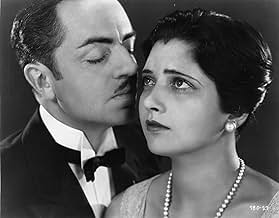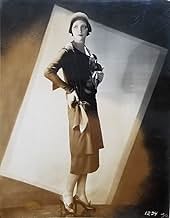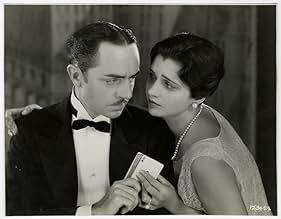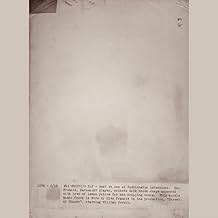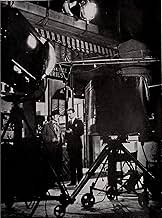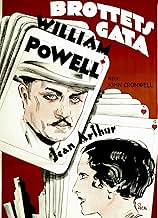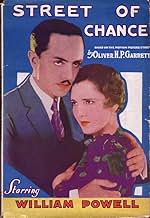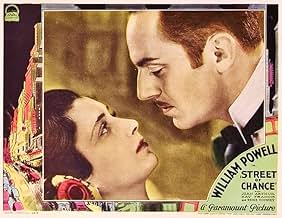IMDb RATING
6.4/10
455
YOUR RATING
A big-time, but honest gambler has to prevent his younger brother from following in his footsteps, and taking up gambling.A big-time, but honest gambler has to prevent his younger brother from following in his footsteps, and taking up gambling.A big-time, but honest gambler has to prevent his younger brother from following in his footsteps, and taking up gambling.
- Nominated for 1 Oscar
- 3 wins & 1 nomination total
Oscar Apfel
- Bartender
- (uncredited)
G. Pat Collins
- Police officer
- (uncredited)
John Cromwell
- Imbrie
- (uncredited)
Gordon De Main
- Gambler
- (uncredited)
Jack Luden
- Holland House Hotel Clerk
- (uncredited)
William H. O'Brien
- Waiter
- (uncredited)
Broderick O'Farrell
- Gambler
- (uncredited)
Featured reviews
'Natural' Davis (William Powell) is a respected gambler who follows a ruthless code of honour with those who cheat against him. His wife Alma (Kay Francis) wants to divorce him because of his addiction and lifestyle but they agree on a reconciliation and 2nd honeymoon together and 'Natural' promises to give up gambling. However, his plans change when his brother 'Babe' (Regis Toomey) arrives in town...............
This is a well acted film with William Powell very good in the lead role and Kay Francis a little irritating at times with her facial over-emoting. However, Powell carries the film and pulls it into the "good" category. It has a slightly downbeat ending.
This is a well acted film with William Powell very good in the lead role and Kay Francis a little irritating at times with her facial over-emoting. However, Powell carries the film and pulls it into the "good" category. It has a slightly downbeat ending.
New York businessman William Powell (as John "Jack" B. Marsden) is really the city's notorious underworld gambler "Natural Davis" (modeled after the infamous Arnold Rothstein). While very successful at what he does (due to playing the percentages), Mr. Powell wants to get out of the racket. He has received a separation summons from model-ish posing Kay Francis (as Alma), who is tired of being the stay-at-home gambler's wife. Powell is also feeling some remorse about having a lowly compatriot (Brooks Benedict) shot dead. He prides himself on being honest, and will kill those who don't play by the rules. Nobody welches.
Powell promises Ms. Francis he will give up gambling, and they plan a second honeymoon.
Then, Powell's similarly gambling-addicted kid brother Regis Toomey (as Alan "Babe" Marsden) arrives from San Francisco. Newly married to Jean Arthur (as Judith), he is in New York to gamble Powell's cash wedding gift into bigger bucks - and he wants to do it in the company of the legendary "Natural Davis" (not knowing "Natural" is his brother). This is, of course, an eyebrow-raising plot development, since Mr. Toomey should probably be thinking he will lose his shirt in such a match-up - so, let's just call him overconfident. Well, Powell concocts a plan to quit gambling, re-gain his wife, and cure his brother's gambling itch...
"Street of Chance" is a typically spotty production for the times, but it does contain some great-looking moments, courtesy of director John Cromwell and photographer Charles Lang. Howard Estabrook received an "Academy Award" nomination for cleverly white-washing this story of a real life gambler; he uses natural dialogue - answering "Good morning" with "What's good about it?" And, quotes from popular songs (like "Button Up Your Overcoat)" certainly ticked some fancy. Powell is a commanding lead, and the incidental characters are colorful; as "Tony" the one-armed newspaper salesman, John Risso is most memorable.
******* Street of Chance (2/3/30) John Cromwell ~ William Powell, Kay Francis, Regis Toomey, Jean Arthur
Powell promises Ms. Francis he will give up gambling, and they plan a second honeymoon.
Then, Powell's similarly gambling-addicted kid brother Regis Toomey (as Alan "Babe" Marsden) arrives from San Francisco. Newly married to Jean Arthur (as Judith), he is in New York to gamble Powell's cash wedding gift into bigger bucks - and he wants to do it in the company of the legendary "Natural Davis" (not knowing "Natural" is his brother). This is, of course, an eyebrow-raising plot development, since Mr. Toomey should probably be thinking he will lose his shirt in such a match-up - so, let's just call him overconfident. Well, Powell concocts a plan to quit gambling, re-gain his wife, and cure his brother's gambling itch...
"Street of Chance" is a typically spotty production for the times, but it does contain some great-looking moments, courtesy of director John Cromwell and photographer Charles Lang. Howard Estabrook received an "Academy Award" nomination for cleverly white-washing this story of a real life gambler; he uses natural dialogue - answering "Good morning" with "What's good about it?" And, quotes from popular songs (like "Button Up Your Overcoat)" certainly ticked some fancy. Powell is a commanding lead, and the incidental characters are colorful; as "Tony" the one-armed newspaper salesman, John Risso is most memorable.
******* Street of Chance (2/3/30) John Cromwell ~ William Powell, Kay Francis, Regis Toomey, Jean Arthur
When, many moons ago, I interviewed director John Cromwell for an article I was preparing on the first big gangster-film star of the late Twenties/early Thirties, George Bancroft, I mentioned STREET OF CHANCE (Paramount; 1930) to him as an aside, it not containing Bancroft. His initial response was to confuse its genesis with gambler Nicky Arnstein, who, if I recall correctly, was married to Fannie Brice; but upon my putting forth Arnold Rothstein as the more likely source, he agreed. Arnstein was a gambler and apparent scoundrel; Rothstein also a gambler albeit far more notorious, infamously credited with having fixed a baseball World Series; his shooting death in 1928 was never solved. In STREET OF CHANCE, the shooting of the William Powell gambler is implied without being shown; his dying words, given in an ambulance rushing him to a hospital in response to an attendant's bet that he'll live, signals the film's final fadeout, these being, "You lose." When I complimented the director on this powerful, yet understated finale, he modestly responded something like, "Well, that's the kind of thing we were trying to do then." If, as John implied, such creativity was the order of the day, I've seen scant examples worthy of this one! Paramount remade the film in 1937 as HER HUSBAND LIES, starring Ricardo Cortez as the ill-fated gambler. A good little film, but lacking the tour-de-force quality engendered by the original which, sad to say, is a virtually forgotten motion picture.
Regards, Ray Cabana, Jr.
Regards, Ray Cabana, Jr.
This was quite enjoyable on a few levels. The lead actors in general has good strong performances, with Kay Francis having a few bad scenes. I blame the director for choosing those because other scene with her were totally believable. At first the story seemed a little confusing but quickly was understandable. A couple favorite scenes of mine were where William Powell finishes talking to Kay Francis and then walks out. Most films of the time would have cut the moment he walked out, but the camera kept rolling and we saw Francis slump down in dispare. The other favorite was the top down card scene towards the end. Overall, I would mainly recommend this to fans of the Thin Man series or other serious "black and white fans." It's definitely a hidden gem.
In watching the early Paramount talkies with William Powell it never ceases to amaze that Powell stage trained voice that he had apparently knew instinctively how to modulate for the new medium of talking motion pictures. It was why he was able to have three successful Philo Vance films and Street Of Chance is in the same mode.
Powell's character of 'Natural' Davis is of course modeled on the legendary Arnold Rothstein who gambled with quite a bit more than just games of chance. This is the life Powell has chosen for himself and he and wife Kay Francis are content. He's the best at what he does in a business filled with uncertainty.
But this is not a life he wants for his brother Regis Toomey who comes into town wanting to try the gambling world and be the best like 'Natural Davis. That's not what Powell wants for his kid brother, he wants Toomey to be and stay respectable. Tragedy results when Powell tries some desperate means to keep Toomey from the life.
Powell and Francis are at the top of their game and Toomey registers well as the eager younger brother. Jean Arthur is here as well, but she's really not the Jean Arthur who developed later on in those Thirties screwball comedies, she took quite a while to develop as a screen personality.
Street Of Chance shows William Powell at really good advantage in a carefully delineated role. For his fans definitely catch this one.
Powell's character of 'Natural' Davis is of course modeled on the legendary Arnold Rothstein who gambled with quite a bit more than just games of chance. This is the life Powell has chosen for himself and he and wife Kay Francis are content. He's the best at what he does in a business filled with uncertainty.
But this is not a life he wants for his brother Regis Toomey who comes into town wanting to try the gambling world and be the best like 'Natural Davis. That's not what Powell wants for his kid brother, he wants Toomey to be and stay respectable. Tragedy results when Powell tries some desperate means to keep Toomey from the life.
Powell and Francis are at the top of their game and Toomey registers well as the eager younger brother. Jean Arthur is here as well, but she's really not the Jean Arthur who developed later on in those Thirties screwball comedies, she took quite a while to develop as a screen personality.
Street Of Chance shows William Powell at really good advantage in a carefully delineated role. For his fans definitely catch this one.
Did you know
- TriviaThe Alfred Hitchcock Hour (1962-1965) remade this story under the title of "A Piece of the Action" starring Gig Young and Robert Redford. It was the premier program of the show.
- ConnectionsFeatured in David O. Selznick: 'Your New Producer' (1935)
- How long is Street of Chance?Powered by Alexa
Details
- Runtime
- 1h 15m(75 min)
- Color
- Aspect ratio
- 1.20 : 1
Contribute to this page
Suggest an edit or add missing content

